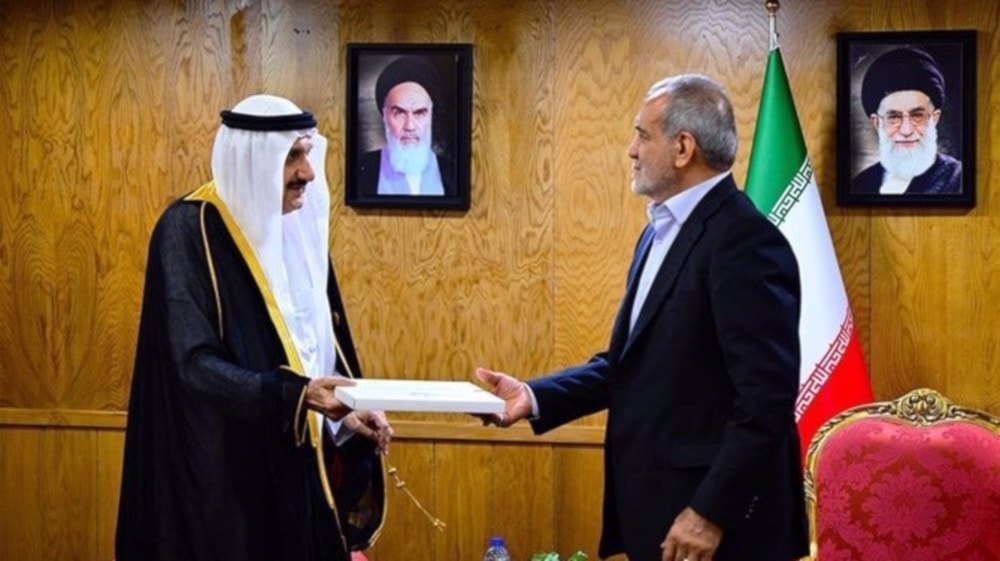Gulf seeks to assure Tehran of neutrality amid rising tensions: Report
Gulf Arab states have worked to reassure Iran of their neutrality during meetings in Doha this week.
-

Saudi Minister of State Prince Mansour bin Miteb bin Abdulaziz (L) submits a written message from King Salman to Iran’s President Masoud Pezeshkian during a meeting in Tehran on July 30, 2024. (SPA)
Gulf Arab states have sought to reassure Iran of their neutrality amid rising tensions in the region, during meetings in Doha this week, on the back of concerns that a broader escalation could threaten their oil facilities, two sources told Reuters.
Ministers from the Gulf Arab states and Iran, who were attending an Asian nations summit hosted by Qatar, focused their discussions on de-escalation, according to the sources.
Iran launched its largest-ever attack on "Israel" on Tuesday, with the IRGC announcing that 200 missiles were fired from Iran toward the occupied Palestinian territories.
"We have targeted the heart of the occupied territories in response to the assassination of martyrs Haniyeh, Sayyed Hassan Nasrallah, and Nilforooshian," the IRGC said in a statement.
Tehran stated that its attack was over unless provoked further, but "Israel" has vowed to retaliate strongly.
'Israel' threatens Iranian oil production facilities
Axios, citing Israeli officials, reported on Wednesday that "Israel" might target oil production facilities in Iran as part of its retaliation.
De-escalation was a key topic of all current discussions, one of the sources said as reported by Axios.
Iran has not threatened to target Gulf oil facilities, but it has warned that if "Israel supporters" intervene directly, their interests in the region would be targeted, as per the report.
"The Gulf states think it's unlikely that Iran will strike their oil facilities, but the Iranians are dropping hints they might from unofficial sources. It's a tool the Iranians have against the U.S. and the global economy," Ali Shihabi, a Saudi commentator close to the Royal Court, said as quoted by Axios.
Why it matters
Saudi Arabia, the world’s top oil exporter, has seen a political thaw with Tehran in recent years, which has helped reduce regional tensions.
Saudi Arabia remains cautious about potential Iranian attacks on its oil infrastructure, particularly after a 2019 assault on its key Abqaiq refinery, which temporarily disrupted more than 5% of the global oil supply. It is worth noting that Iran denied involvement in the attack.
Shihabi, referring to the Gulf Cooperation Council (GCC), which includes the UAE, Bahrain, Saudi Arabia, Oman, Qatar, and Kuwait, said, "The GCC message to the Iranians is, 'please de-escalate'".
During the event in Doha, Iranian President Masoud Pezeshkian stated that Iran would be prepared to respond and cautioned against remaining "silent" in the face of "Israel’s" "warmongering".
He added, "Any type of military attack, terrorist act or crossing our red lines will be met with a decisive response by our armed forces."
Read next: Russia concerned over Israeli signs of possibly striking Iran: Ryabkov

 3 Min Read
3 Min Read








